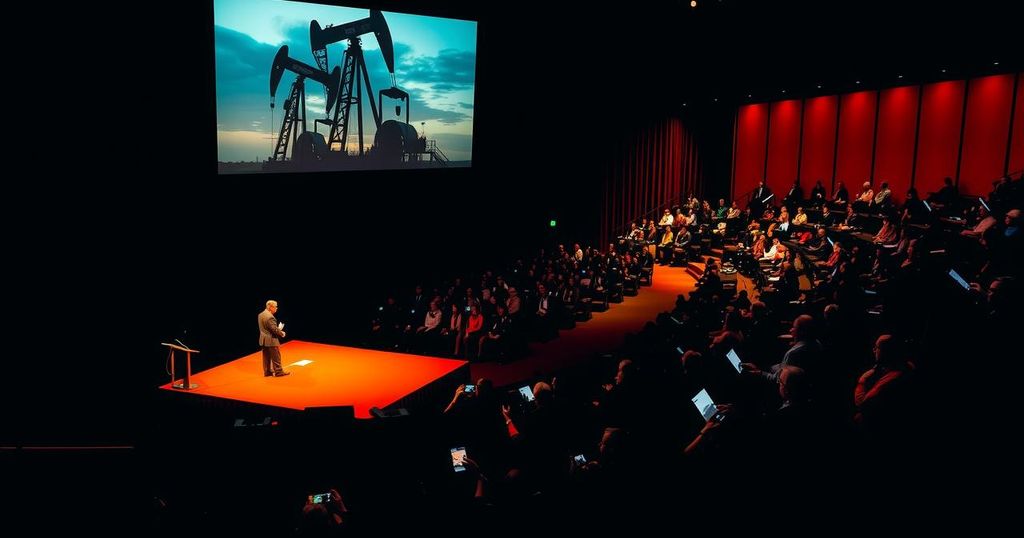COP29: Tensions Rise Over Fossil Fuel Agreements Amid Climate Negotiations

COP29 climate talks in Baku, Azerbaijan, are marred by clashes over fossil fuel agreements, with developed nations expressing discontent over a draft that may reverse prior commitments. Developing nations demand financial support for climate initiatives and criticize the lack of specific funding figures. As tensions rise, the talks exemplify the complex challenges of balancing economic growth with urgent climate commitments.
A significant dispute has emerged at the COP29 climate talks, as prominent nations expressed concern that a draft agreement could undermine a pivotal commitment to reduce fossil fuel reliance. UK Energy Minister Ed Milband emphasized that stagnation is tantamount to regression, warning that such an outcome would draw harsh judgment from the global community. The UK, European Union, New Zealand, and Ireland have deemed the proposed agreement “unacceptable,” reflecting a growing discontent among developed nations regarding the direction of discussions.
Developing countries are expressing dissatisfaction over the lack of financial support aimed at aiding their climate change mitigation efforts. Almost 200 nations convened in Baku, Azerbaijan, aim to determine future actions in the fight against climate change. The discussions revolve around balancing commitments to reduce fossil fuel usage and the provision of funding from wealthy nations. Some nations, particularly those with significant fossil fuel interests, are hesitant to adopt stringent measures that could hinder their economic development.
EU Climate Action Commissioner Wopke Hoekstra criticized the draft agreement as “unbalanced, unworkable, and unsubtle,” while U.S. Climate Envoy John Podesta expressed surprise at the absence of provisions reflecting last year’s commitments made in Dubai. Samoan Minister Cedric Schuster, representing vulnerable small island nations, insisted on preserving the progress achieved in prior conferences, stating, “We cannot afford to undermine the progress achieved less than a year ago in Dubai.”
As frustrations mount, it has been noted that the COP29 host, Azerbaijan, has produced a draft that mirrors the views of the Arab group of countries, including oil-rich nations like Saudi Arabia and China, who perceive the previous fossil fuel agreement as merely a suggestion rather than a directive. Minister Eamon Ryan of Ireland suggested that there is a notable attempt to reinterpret last year’s commitments, constituting a clear backslide in the negotiations.
Additionally, developing nations accuse richer countries of failing to uphold their promises made during the 2015 Paris Agreement, particularly in relation to funding for climate initiatives. A proposed finance agreement lacks definitive figures, leading to strong criticism from representatives of the G77+China bloc, who demand $1.3 trillion in funding by 2030. Bolivia’s chief negotiator Diego Pacheco described the absence of concrete financial commitments as an affront to global southern countries.
As part of the ongoing negotiations, developing nations also seek clarity on how future funding will be allocated between grants and loans, expressing concern over escalating debt burdens resulting from increased borrowing.
In summary, the discussions at COP29 underscore a mounting tension between developed and developing nations regarding commitments to combat climate change, financial support mechanisms, and the overall trajectory of fossil fuel policies.
In conclusion, COP29 serves as a critical juncture for international climate negotiations, with strong divisions emerging over fossil fuel reduction agreements and the accompanying financial commitments. The ongoing deliberations will be pivotal in shaping global climate action and the future of sustainable development, as nations grapple with the complexities of their obligations to each other and to the planet.
COP29 is poised to be a decisive moment in climate policy, possessing profound implications for both developed and developing countries in the global landscape.
COP29, the annual Conference of the Parties to the United Nations Framework Convention on Climate Change, represents a significant platform for international climate negotiations. The focus of these talks is to build upon commitments made in previous conferences, particularly the landmark Paris Agreement of 2015, where developed nations pledged financial assistance to help developing countries transition away from fossil fuels. As nearly 200 countries gather in Baku, Azerbaijan, the discussions reflect a complex interplay of economic interests and environmental responsibilities, particularly concerning fossil fuel reliance and financial commitments to vulnerable nations.
The rift emerging at COP29 highlights the challenges in reconciling the economic realities faced by fossil fuel-dependent countries with the urgent need for climate action. As developed nations push for stringent fossil fuel reduction commitments, developing countries insist on securing financial support to effectively address climate change impacts. The outcomes of these discussions not only have implications for future climate negotiations but also for global efforts to achieve sustainability in an increasingly volatile climate landscape.
Original Source: www.bbc.com






